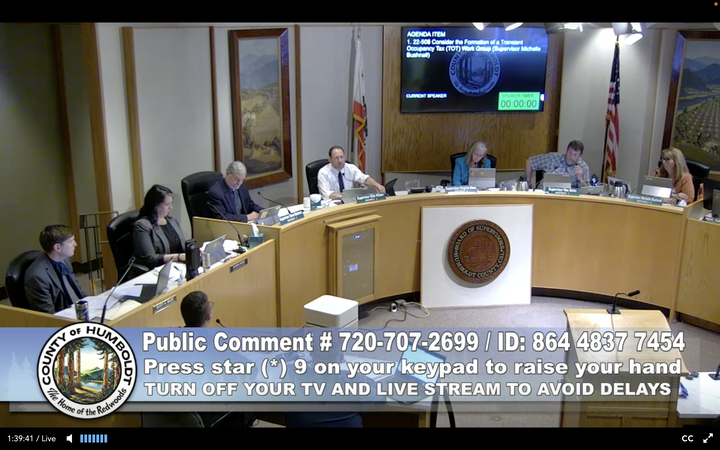The Humboldt County Board of Supervisors. | Screenshot.
###
Fallout from the county’s fiscal management problems just keeps spreading.
On Tuesday, following another contentious hearing with Auditor-Controller Karen Paz Dominguez, the Board of Supervisors unanimously agreed to authorize a letter referring one of those problems to the state — specifically, to the Fair Political Practices Commission and the Department of Justice.
The problem, according to the county’s Workforce Development Board, is that the state’s Employment Development Department (EDD) has issued a cash hold, freezing some of the county’s most important workforce program funding, because the county has yet to submit its long-overdue single audit for fiscal year 2019-20.
Scott Adair, the county’s economic development director, said at today’s meeting that when the Workforce Development Board first learned that those funds were at risk, back in November, they invited Paz Dominguez to a meeting in hopes of getting “additional detail and an explanation” for the report’s delinquency.
“The auditor-controller at that time made a commitment to have the single audit report completed by March of this year,” Adair said, adding, “That did not occur.”
Shortly thereafter, he noted, the Workforce Development Board adopted a resolution of “no confidence” in the Auditor-Controller’s Office.
The cash hold has since been put into effect, Adair said, and since the Workforce Development Board is merely an advisory body, it needs the supervisors’ approval to communicate with state authorities in hopes of resolving the matter. Ideally, the state will release the hold with an assurance that the single audit is all but complete, he explained.
In the meantime, with the state funds now frozen, the county’s economic development division has been forced to dip into the county’s general fund to keep operating its workforce development program, with the hope that those expenditures will be eligible for reimbursement down the line, according to Adair. “We have been told by the state that we have until the end of this fiscal year [on June 30] to remedy the single audit issue, after which expenditures may not be available for reimbursement,” he said.
Appearing via Zoom, Paz Dominguez disputed Adair’s take on the situation, saying his characterization of matters was “not correct.” She said the funding in question has not, in fact, been placed on a cash hold because no requests have actually been submitted and rejected by the state.
Paz Dominguez also said that the single audit report has now been completed by outside accounting firm MGO, though she added that the firm is still waiting on a couple of items related to payroll and cash reconciliations.
“I don’t want the impression to be that this is something the Office of the Auditor-Controller is holding up purposefully or that it’s something within our control to do at this point,” Paz Dominguez said.
Given a chance to respond, Adair pushed back. He read from a March 15 email from the regional EDD representative informing the county that the cash hold went into effect on March 4 and will remain in place until the agency receives proof that the county’s 2019-20 single audit is complete.
This argument over the basic facts of the situation continued. County Administrative Officer Elishia Hayes disputed Paz Dominguez’s claim that the single audit is complete, saying that won’t technically be the case until the county’s financial statements are completed. There is $28 million in transactions from the 2019-20 fiscal year that have yet to be reconciled, Hayes said. Those transactions — upwards of 700 or 800 of them, altogether — appear on the county’s bank statements but not in its financial system. Hayes said she’d be asking the board later in the meeting for permission to have her office’s staff step in to help identify those transactions.
“We would like to put all resources possible [toward] completing the audit,” Hayes said. “It is of the utmost concern at this point in time, and it’s our hope to have it done by June 30, if not sooner.”
The board’s discussion on the Workforce Development Board matter was complicated by the fact that, in the corresponding staff report, it was lumped together with a couple of documents that weren’t directly related to the questions at hand.
One was a recent memo in which 13 of the county’s 19 department heads say Paz Dominguez “has failed to fulfill the duties and responsibilities of her position.” The other was a “fact sheet” prepared by the CAO’s Office that lists upwards of 40 “deficiencies” with which Paz Dominguez’s tenure as auditor-controller’s has allegedly been “marred.”
Paz Dominguez argued that the “fact sheet” is “not actually factual,” and she suggested that any letters submitted to the state about the workforce program funding situation should be written jointly, with her own involvement.
“I would be more than happy to have them come in and investigate the operations of this county so that they can see the challenges that we face as a county together,” she said.
Third District Supervisor Mike Wilson said he was disappointed with the “fact sheet” and would not want it forwarded to the state. Second District Supervisor Michelle Bushnell, who serves on the Workforce Development Board, clarified that the “fact sheet” would not be sent.
Hayes discouraged the board from accepting Paz Dominguez’s request for a joint letter, saying that while the auditor-controller should feel free to submit her own correspondence, the Workforce Development Board’s request was simply to forward their concerns to state agencies.
A clearly annoyed First District Supervisor Rex Bohn said Paz Dominguez could write “as many letters as she wants … or she could do the single audit, or we could get this stuff done timely.”
Bushnell made a motion to have staff forward the Workforce Development Board’s concerns to the state. She later amended it to “recognize and accept” the memo from department heads expressing dissatisfaction with the Auditor-Controller’s Office.
Paz Dominguez again voiced objections, saying that the Workforce Development Board’s stated concerns aren’t based in fact.
“There’s one person who is named and accused” in the board’s communications, she said, referring to herself. “And I think it’s important that we all recognize that is not appropriate or correct, because this is a county-wide issue. It’s a systemic flaw in this county.”
During the public comment period, regular commenter Kent Sawatzky suggested that the “fact sheet” constitutes slander, and that Paz Dominguez has every right to sue the county over it. He also suggested that the county should commission a forensic audit from the state to truly understand the source of its fiscal issues.
Connie Stewart, the executive director of initiatives at Cal Poly Humboldt and regional organizer of the Humboldt Workforce Coalition, called in to tell the board that the cash hold is indeed affecting workforce program funding. “And I’m not sending invoices in right now because I don’t want them to go to collections,” she said.
Stewart added that there are “millions and millions of dollars” in grant funding that will be up for grabs in the next couple of months. “And [with] some of those grants, it requires the Workforce Development Board to be the sponsor,” she said. “And unfortunately, because we do not have the single audit, it is very unlikely that we will get those grants.”
After the public comment period, there was yet more argument about the underlying facts of the situation, with Hayes and Paz Dominguez offering conflicting characterizations of the $28 million in unreconciled transactions, with Hayes saying county departments have submitted all necessary documentation while Paz Dominguez insisted that other departments — notably, the Department of Health and Human Services — have yet to reconcile their own transactions.
At the end of this convoluted and quarrelsome discussion, the board voted unanimously to authorize staff to send along the Workforce Development Board’s concerns to the state.
There was a lot more discussed at Tuesday’s meeting, including a deliberation over which department should be managing county payroll and the board’s decision on how to distribute Measure Z revenues for the upcoming fiscal year. Check back Wednesday for more coverage.


CLICK TO MANAGE